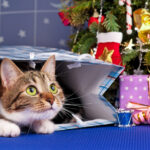Winter, the Holidays, and Your Animals
You might find it cute and amusing when you see a Chihuahua wearing a miniature coat, but there are practical reasons for such canine fashion. Small dogs have a high body surface to weight ratio and lose body heat much more quickly than larger dogs. A snug sweater can provide a needed protective layer as well as make a fashion statement.
Colder weather means it is time to “winterize” your animals. Here are some tips from the NC State University College of Veterinary Medicine for keeping your animals comfortable, healthy, and safe this winter.
Handling the elements
Snow can be fun for everyone and daily exercise is necessary for health but be mindful of the temperature and the time  spent outdoors. Fur does not mean complete protection from the cold.
spent outdoors. Fur does not mean complete protection from the cold.
- Check your dog’s paws for ice around the pads and for irritation from sidewalk and road salt, which can lead to cracked
paws, discomfort, and possible infection; - Be careful on off-lease hikes that your dog does not venture out onto frozen ponds and lakes to break through too thin an ice cover;
- Be aware colder temperatures may mean outdoor cats and wildlife may find car engines offer a warm respite;
- Make sure horses and other outdoor animals have constant access to liquid water when the temperature drops below freezing;
- Some manufacturers are changing chemicals used in antifreeze, but assume any spills are highly toxic and even a few licks or walking through the fluid can be deadly;
- Other potentially dangerous items include windshield washing fluid and ice melt products that can cause gastrointestinal tract irritation, depression, weakness, seizures, cardiac issues, and other life threatening issues.
Holiday hazards
‘Tis the season when routines are abandoned and visitors, holiday decorations, and general hustle and bustle can challenge owners of adventurous pets.
- The best policy is to simply keep people food away from your pet by not giving unhealthy treats or allowing unguarded access to food, leftovers, or garbage;
- Keep pets away from holiday plants such as poinsettias, mistletoe, holly, and Christmas rose;
- Watch pets around decorations including ornaments, ribbon, tinsel, gift wrapping, candles, lights and cords (try decorating the lower portion of the Christmas tree with non-breakable decorations);
- Be careful people toys and gifts are not too great a temptation for a curious pet;
- Ensure pets cannot access possibly toxic Christmas tree water;
- Be extra careful with your holiday trash.
 If your animal has an “off-hours” health issue and your veterinarian is not available, NC State University’s Small Animal Emergency Service is open 24 hours a day, seven days a week.
If your animal has an “off-hours” health issue and your veterinarian is not available, NC State University’s Small Animal Emergency Service is open 24 hours a day, seven days a week.
The location is 1052 William Moore Drive near the intersection of Hillsborough and Blue Ridge in Raleigh, NC.
Please call 919.513.6911 to inform clinicians of your pet’s emergency.


